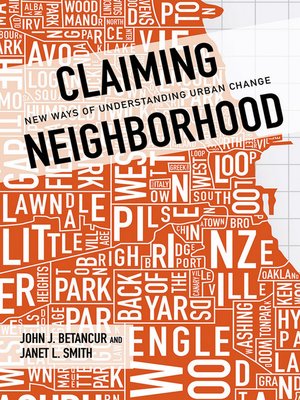
Sign up to save your library
With an OverDrive account, you can save your favorite libraries for at-a-glance information about availability. Find out more about OverDrive accounts.
Find this title in Libby, the library reading app by OverDrive.



Search for a digital library with this title
Title found at these libraries:
| Library Name | Distance |
|---|---|
| Loading... |
Based on historical case studies in Chicago, John J. Betancur and Janet L. Smith focus both the theoretical and practical explanations for why neighborhoods change today.
As the authors show, a diverse collection of people including urban policy experts, elected officials, investors, resident leaders, institutions, community-based organizations, and many others compete to control how neighborhoods change and are characterized. Betancur and Smith argue that neighborhoods have become sites of consumption and spaces to be consumed. Discourse is used to add and subtract value from them. The romanticized image of "the neighborhood" exaggerates or obscures race and class struggles while celebrating diversity and income mixing. Scholars and policy makers must reexamine what sustains this image and the power effects produced in order to explain and govern urban space more equitably.
| Cover Title Copyright Contents Introduction 1. Prevailing Approaches to the Study of Neighborhoods and Change 2. Understanding Change in Today's Changing Urban Mosaic 3. Recasting Race/Ethnicity: The Gentrification of Bronzeville and Pilsen 4. Constructing Carceral Space: How Englewood Became the Ghetto 5. Constructing Flexible Spaces of Accumulation and Social Reproduction 6. Selling the Neighborhood: Commodification versus Differential Space 7. Reinventing Neighborhood? Transforming Chicago's Public Housing 8. Building the Organization or Building the Community? Community Development in a Time of Flexible Accumulation Conclusion Notes References Index | "This book takes a fresh look behind the numerous social science representations of Chicago to reveal how they actively shape neighborhoods as they are taken up by the public and private sectors . A definite must read for urban scholars."
—Susan Saegert, The Graduate Center of the City University of New York
"In all, the importance of Claiming Neighborhood is that it transcends Chicago and,...can be beneficial to other approaches in looking at forces that impact spaces and centers in cities around the United States." —National Political Science Review
|John J. Betancur is a professor of urban planning and policy at the University of Illinois at Chicago. Janet L. Smith is an associate professor of urban planning and policy at the University of Illinois at Chicago.
As the authors show, a diverse collection of people including urban policy experts, elected officials, investors, resident leaders, institutions, community-based organizations, and many others compete to control how neighborhoods change and are characterized. Betancur and Smith argue that neighborhoods have become sites of consumption and spaces to be consumed. Discourse is used to add and subtract value from them. The romanticized image of "the neighborhood" exaggerates or obscures race and class struggles while celebrating diversity and income mixing. Scholars and policy makers must reexamine what sustains this image and the power effects produced in order to explain and govern urban space more equitably.
| Cover Title Copyright Contents Introduction 1. Prevailing Approaches to the Study of Neighborhoods and Change 2. Understanding Change in Today's Changing Urban Mosaic 3. Recasting Race/Ethnicity: The Gentrification of Bronzeville and Pilsen 4. Constructing Carceral Space: How Englewood Became the Ghetto 5. Constructing Flexible Spaces of Accumulation and Social Reproduction 6. Selling the Neighborhood: Commodification versus Differential Space 7. Reinventing Neighborhood? Transforming Chicago's Public Housing 8. Building the Organization or Building the Community? Community Development in a Time of Flexible Accumulation Conclusion Notes References Index | "This book takes a fresh look behind the numerous social science representations of Chicago to reveal how they actively shape neighborhoods as they are taken up by the public and private sectors . A definite must read for urban scholars."
—Susan Saegert, The Graduate Center of the City University of New York
"In all, the importance of Claiming Neighborhood is that it transcends Chicago and,...can be beneficial to other approaches in looking at forces that impact spaces and centers in cities around the United States." —National Political Science Review
|John J. Betancur is a professor of urban planning and policy at the University of Illinois at Chicago. Janet L. Smith is an associate professor of urban planning and policy at the University of Illinois at Chicago.







